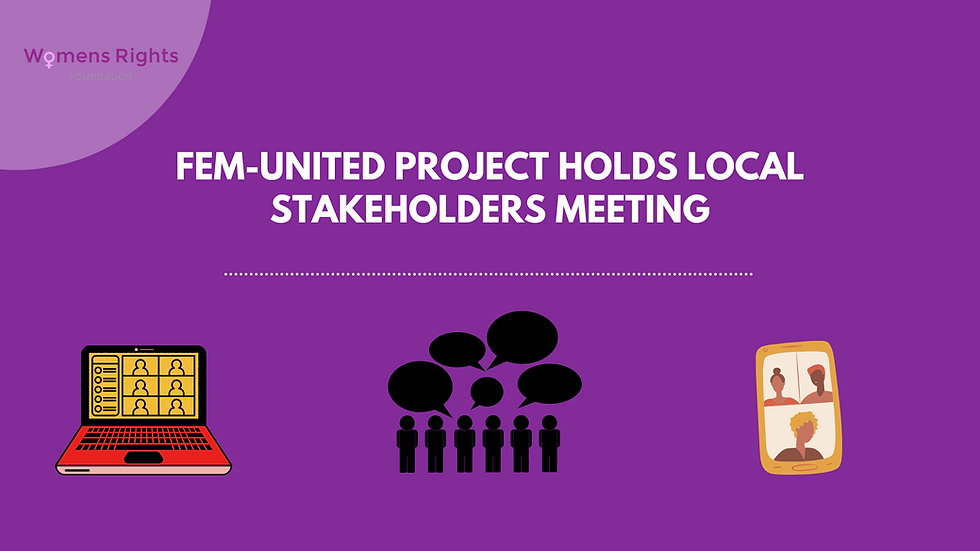FREQUENTLY ASKED QUESTIONS ABOUT EMERGENCY CONTRACEPTION
- Womens Rights Foundation

- Dec 2, 2017
- 5 min read
What is an emergency contraceptive (EC)?
Emergency Contraception (EC), also known as post coital contraception or the morning after pill refers to the contraceptive methods that women can use to prevent pregnancy after unprotected sexual intercourse. Access to EC is essential for ensuring women’s reproductive health. Currently, there are four types of EC methods available in Europe: Levonorgestrel-only EC pills (LNG ECP) EC pills containing ulipristal acetate (UPA ECP) EC pills containing mifepristone Copper intrauterine devices (IUDs) inserted up to five days after intercourse. Additionally, in settings where there are no EC products available, combined oral contraceptive pills containing both progestin and estrogen can be used as Emergency Contraception, termed the “Yuzpe” regimen.(1)
How does emergency contraceptive work?
Emergency contraceptive pills (ECPs) work before pregnancy. They must be taken as soon as possible after unprotected sex, and are recommended to be taken within 3-5 days. They are not effective after this time. They work by preventing the release of an egg (ovulation) or by stopping the egg and sperm from meeting. The use of ECPs cannot terminate or interrupt an established pregnancy and will not stop a fertilized egg from implanting in the uterus, nor do they harm a developing embryo. (2)
There is no evidence to suggest that either levonorgestrel (LNG, such as Plan B) or ulipristal acetate (UPA, such as Ella One) works after an egg is fertilized.(3)
Why is the availability of emergency contraceptives important?
Emergency contraceptives offer women an important second chance to prevent pregnancy when a regular method fails, no method was used, or sex was forced. Research over the past 30 years has shown that these methods are safe and effective. EC is endorsed by the World Health Organization and many other international and national organizations (4). Depending on the method used, emergency contraception can reduce a woman’s risk of becoming pregnant from a single act of intercourse by between 75 and 99 percent.
Are the morning-after pill and the abortion pill the same?
Emergency contraceptive pills (ECPs) are contraceptive methods that work after unprotected sex but before pregnancy. ECPs are not medical abortion (sometimes referred to as the “abortion pill”). The two therapies are different and it is important not to confuse them.
While ECPs need to be taken within a few days after unprotected sex, the timeframe for medical abortion is up to two months (63 days) after a woman misses her period, during early pregnancy. After the pregnancy is confirmed, the woman takes a large dose (200-600 mg) of mifepristone, typically followed by another drug called a prostaglandin (misoprostol) that causes uterine contractions. Used this way, the drugs cause an abortion. The dose needed to induce an abortion is 10 to 60 times greater than that used to prevent ovulation and stop a pregnancy from starting, as emergency contraceptive pills do. (5)
Can a woman get emergency contraception in Malta?
In Malta, all medicines must be authorised by the Medicines Authority before they can be imported, and so far they have not authorised any emergency contraceptives.
The government sexual health website (6) states the following:
“Emergency contraceptive drugs, irrespective of type, are not licensed in Malta, and therefore cannot be bought from Maltese pharmacies. The Catholic Church regards any mechanism that blocks or inhibits the implantation of a fertilised ovum an abortion, therefore the morning-after pill is considered as an abortifacient.”
As established above, neither LNG EC nor UPA EC inhibit the implantation of a fertilised ovum, therefore this statement is factually incorrect. Furthermore, there are other hormonal contraceptives available (e.g. Mirena(7) and various brands of the oral contraceptive pill that thin the lining of the endometrium potentially inhibiting the implantation of a fertilised ovum and these are in actual fact available in Malta.
At the same time, there are some forms of medicines that are available and can be used as emergency contraception.
For instance, the Yuzpe regimen (combined estrogen and progestin pills) can be used through taking an overdose of an oral contraceptive pill such as Microgynon 30(8) that is available on prescription.
Esyma(9) which is prescribed for uterine fibroids contains ulipristal, the same active ingredient used in the emergency contraceptive Ella One, though with a different dosage.
The copper IUD, which can also be used as an emergency contraceptive is also available in Malta.
If some form of emergency contraceptive is available, why the fuss to have morning after pill such as Ella One, or Plan B licensed?
As such many doctors are unclear as to whether it is illegal to prescribe the above-mentioned medications for the specific use as ‘emergency contraceptive’. While there is no law explicitly declaring emergency contraceptives as illegal, the fact that the government’s position is that emergency contraceptive medication is yet unlicensed due to its ‘potentially abortifacient nature’ makes members of the medical professionals reluctant due to the fact that abortion is a criminal act in Malta. Furthermore, taking an overdose of available medicine may have more adverse side effects than using the morning after pill and is thus not recommended.
When does science say that pregnancy begins?
Pregnancy is established when a fertilized egg has been implanted in the wall of a woman's uterus. The definition is critical to distinguishing between a contraceptive that prevents pregnancy and an abortifacient that terminates it.
Although widespread, definitions that seek to establish fertilization as the beginning of pregnancy go against the long-standing view of the medical profession. In fact, medical experts—notably the American College of Obstetricians and Gynaecologists (ACOG), the British Medical Association (BMA), the American Medical Association and the Association of Reproductive Health Professionals —agree that the establishment of a pregnancy takes several days and is not completed until a fertilized egg is implanted in the lining of the woman's uterus. (In fact, according to ACOG, the term "conception" properly means implantation.) A pregnancy is considered to be established only when the process of implantation is complete.
Where is Emergency Contraceptive available in the EU?
Emergency Contraception is available across all EU countries except for Malta. At the end of November 2015, the situation was as follows:
UPA ECPs are available without prescription in Austria, Belgium, Bulgaria, Croatia, Cyprus, Czech Republic, Denmark, Finland, France, Germany, Greece, Ireland, Italy, Luxembourg, Poland, Portugal, Romania, Slovakia, Slovenia, Spain, Sweden, Netherlands, and the United Kingdom. Age restrictions have been set in at least 3 countries: Croatia and Italy (for women younger than 18) and Poland (for women younger than 15).
In the Baltic sub region, the new marketing authorisation is being processed in Latvia, Lithuania, and Estonia, and UPA ECPs are expected to be available by 2016.
In Hungary, in January 2015, the government decided that because of patient safety considerations, it will continue to require prescriptions for all types of EC.
In Malta, LNG ECPs and UPA ECPs are not registered or available.
LNG ECPs remain a prescription drug in Hungary and Poland. In Croatia and Italy since October 2015, at least one brand of LNG ECPs is registered as prescription- free products(10).
Does availability and use of emergency contraception lead to more unprotected sex?
Several studies have shown that facilitating access to EC does not increase sexual or contraceptive risk-taking behaviour. Women who received emergency contraception in a non-emergency context (that is, in advance of need) were more likely to use it when needed and to take it within 12 hours after sex, when it is most effective. The results of a study conducted in the United Kingdom demonstrated no correlation between young people’s knowledge of or access to EC and the likelihood that they would become sexually active. Additionally, teens and young women who have used EC do not have a higher risk of sexually transmitted infections, compared with those who have never used emergency contraception(11).
11 www.who.int






Comments